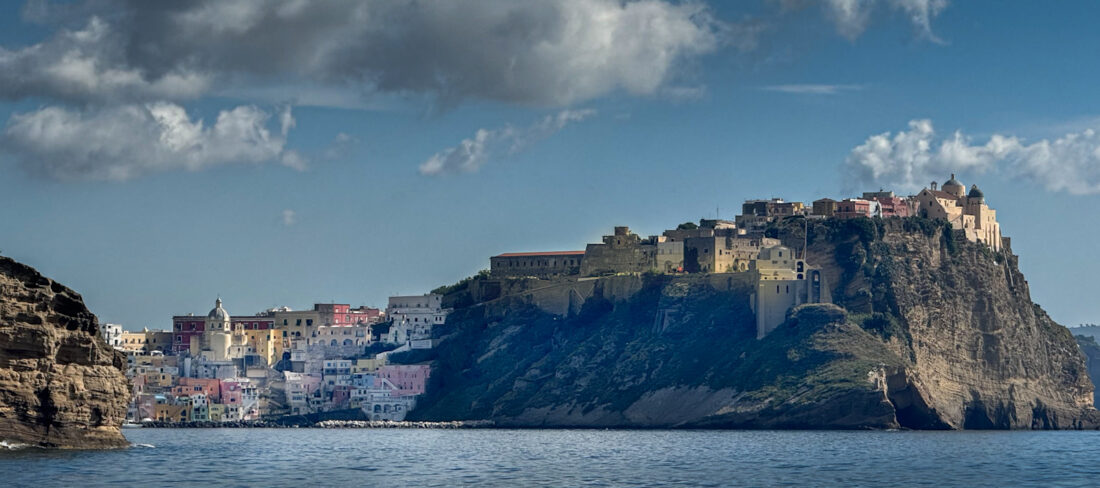Procida
I’ve been on a mission to find the perfect fishing village for years. I have this idea in my head—Local Hero in a warmer climate, for those of you who know and love this movie as much as I do. Actual boats, and fishermen, who fish, small village, no hulking 1960s or 70s ugly beach resorts. Interesting landscapes. Delicious food, bonus for freshly caught. I finally found it, right off the coast of Naples—Procida—where we headed after our trip to Ravello and Materea, at the Hotel Santavenere.
Procida is one of the islands off the coast of Naples, along with its better known sisters, Capri and Ischia. At the ferry dock there were hundreds of people in line for the ferry to Capri and Sorrento, but only about ten of us waiting for Procida. We’d mentioned our next destination that morning to the owner of the hotel we were staying at in Naples, the mid-twenties heir of a wealthy, landed family of hoteliers, dressed in an immaculate suit, who was greeting guests eating breakfast on the roof terrace. When he heard Procida his eyes lit up. “It’s like going way back in time, totally different to today,” he said with his eyes looking to the horizon as he thought of a time period adequately remote to make his point. “It’s like going all the way back to the… 1980s.” Gulp. This appreciation for the island was not limited to him. When we told Italians that we were headed there the usual response was “Brava! Not many people know about it and it’s wonderful.” (Our overnight in Naples, and the hotel, warrant their own story, coming soon.)
We learned about Procida from Sebastian, who had explored it when sailing for a week on a friend’s boat. They moored and had lunch on the island and he was enchanted. He was insistent that we go to experience it. He was imagining us renting a little room on a cliff for a month and doing nothing but staring out the window and writing. After seeing it I can imagine this as well.
We landed at the port after a half-hour ferry ride from Naples. The port has a small harbor, ringed by buildings of pastel colors and restaurants along the quai. We weren’t quite sure enough of the busses yet to know we could get where we needed to go—radically underestimating the island’s simple layout—so we got a taxi. We proceeded along the one main road that follows the length of the spine of the tiny island (it’s less than 1.6 square miles), lined by stone buildings that come right up to the street. These roads are impressively narrow, and I live in an Italian village where I frequently have to pull in my side mirrors to fit between two stone walls. I thought I was unflappable. One of Sebastian’s most distinct memories of the island was seeing how scraped up and dented every car on the island was.
Our taxi sped down the one main road, barely one lane in width, and avoided pedestrians, small delivery trucks laden with goods off the ferry, and many electric bicycles with super fat tires, which seems to be the preferred means of transportation over the hills and rough cobblestone roads. Parts of the island looked familiar—it’s the star of the movie Il Postino and also was one of the locations in The Talented Mr. Ripley.
We arrived at our hotel, La Tonnara, on a spit of land between a little marina, an excellent beach, an a pedestrian causeway to a small nature preserve island. It was simple, but very welcoming. Despite a sign in the room warning us not bring our own hotplates to cook meals, and impression that you might have that I love fancy hotels because of the last entry, I loved it. Sweet staff, fantastic location, and immaculate.
Our first evening we wandered along the long beach past some fantastic rock formations and ended up finding a beach-front restaurant that looked promising, Da Girone (no website, linking to Tripadvisor). We are always a bit suspicious of restaurants with views, especially after seeing the logo from this place, but it was amazing. Family run for decades, everything was fresh and delicious. There were long tables filled with Italian families whose kids ran back and forth between the sea, the sand, and the restaurant while all of us watched the sun set over the water. I’d been told that I had to have a salad made from Procida lemons, which are huge, ugly, and with a very thick pith (the bit between the skin and the juicy part). The salad is made of just the pith, raw and cut into chunks, with a little olive oil, garlic, spicy chili pepper, and mint. The first bite was a bit of an act of will, but it was delicious.
Walking back the short distance to our hotel we spotted a very odd-looking bus. It was tall and unbelievably narrow, clearly purpose built for these streets.
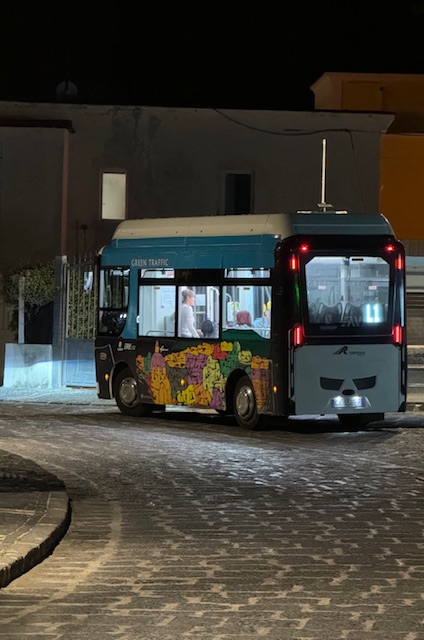
We took it the next day to cross the island. The narrow bus was filled with locals who all knew the driver and one another, and gave us hints on where to go. At one point, on the narrow central road, we met an oncoming bus. They obviously had done this before and met where the stone buildings gave a few extra meters of width, and they successfully passed. That feat was nothing compared to a sharp left turn the driver took at speed in this long bus, between two narrow streets, all tightly bordered by stone buildings. Despite the hundreds of scrapes visible on the corners of the buildings, this bus navigated with ease. I was watching the corner nearest me and I swear that we cleared it by about an inch. This bus ride was as close as I will ever come to experiencing Harry Potter’s Night Bus.
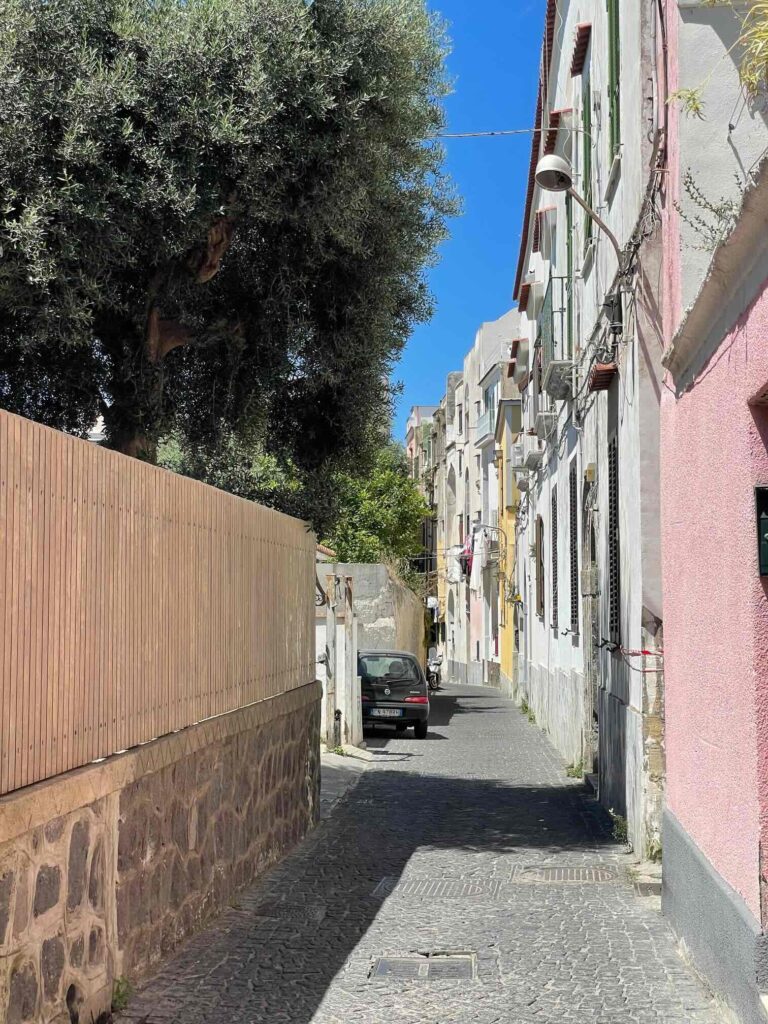
Our destination was a small fishing port accessible only on foot or by boat, La Corricella. We walked to it along the cliffs via an old prison and ancient castle perched on a promontory, then descended down steep stone stairs between tightly-packed, colorful buildings. The small marina with a variety of fishing boats and clear water had several restaurants at water’s edge and we had another delicious meal.
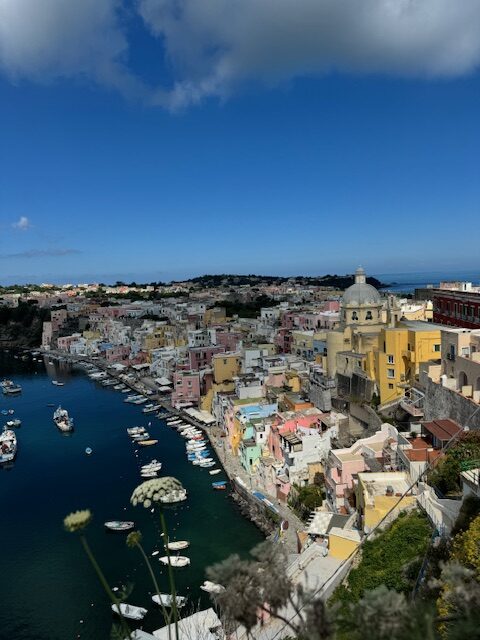
That evening we decided to eat at Da Girone again. One of the owners and her husband served us. After a dessert fresh out of the oven that she had just made, I was paying and bought some homemade liquors. Just then an older man entered who turned out to be her father. He was deaf and she had to shout that they were lucky to have had three dogs in the restaurant that evening (one being our Lola), and he beamed. He said that he made all the liquors and then pointed to the label—their logo of a gruff, sea captain sort, scowling—and held it up next to his face as he mimicked the expression. His daughter looked on, beaming.
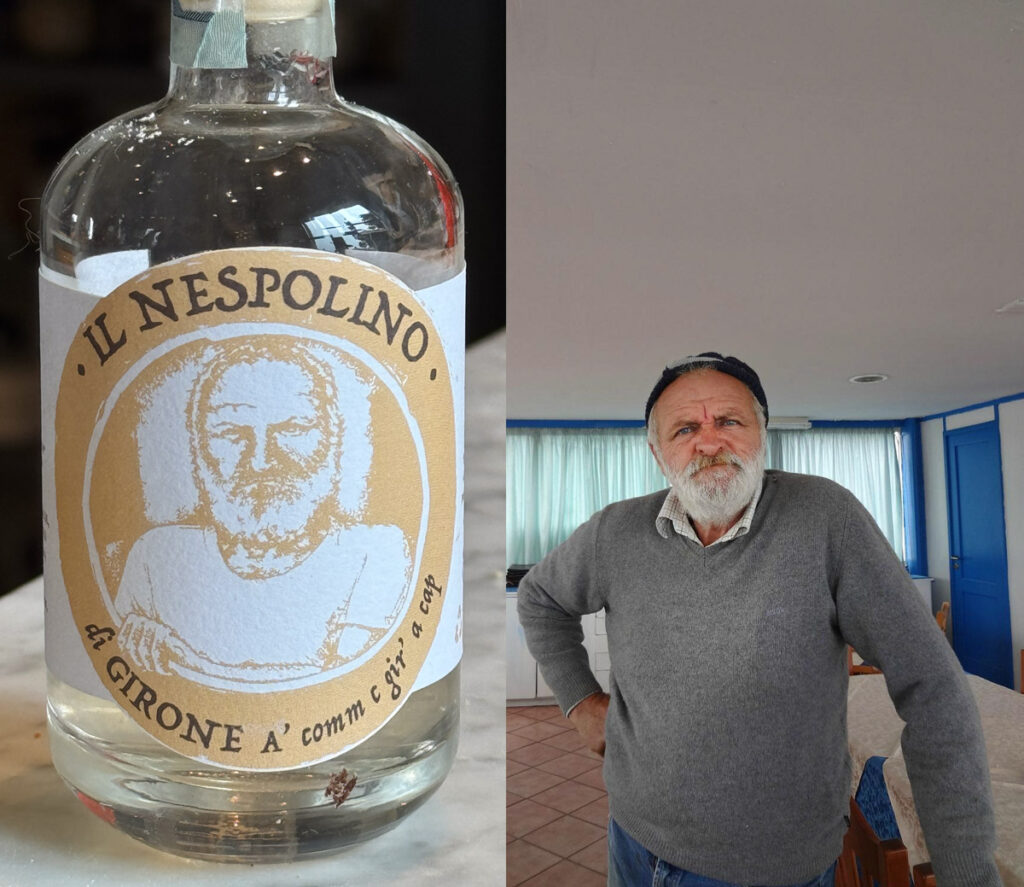
As idyllic as all this sounds, we weren’t completely relaxed. The day that we arrived in Naples, for our overnight before Procida, the supervolcano that lies under Naples was acting up. Forget the dangers of Vesuvius, the Bay of Naples is the collapsed crater of this volcano, which is considered the most dangerous supervolcano in the world as millions live in the highest risk area. The land in part of Naples is rising two centimeters a MONTH. The night before we got there was a swarm of over 150 earthquakes in a few hours, including a 4.4 magnitude. Schools were closed, prisons evacuated, and thousands slept in the street. Procida forms a part of the rim of the supervolcano. It takes a lot less to fuel my anxiety. (The Washington Post wrote an interesting article on this a few days ago.)
But the lure of a cottage overlooking the fishing port…
And I do have to confess that I have found dreamy fishing villages in another part of the world, Scotland, which I wrote about here.


